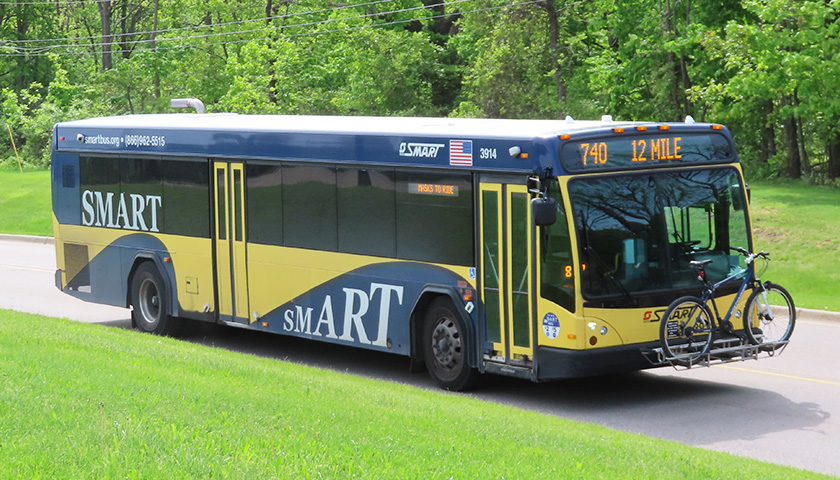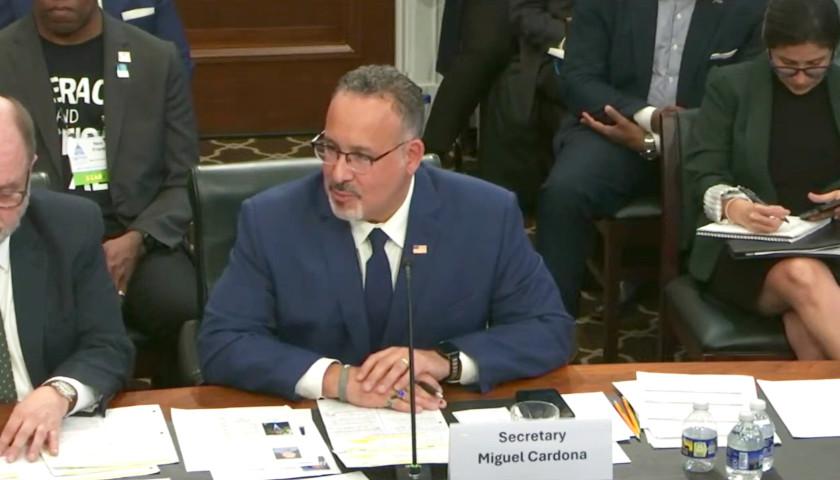by Brett Rowland
SMART officials in suburban Detroit say they won’t release ridership figures for the $147.5 million taxpayer-funded bus operation for fear of misinterpretation.
“We are currently operating at 65% service levels and ridership is trending back to approximately 70%,” said Brandon Adolph, the acting assistant vice president of marketing and communications for Suburban Mobility Authority for Regional Transportation. “Thus, any ridership data wouldn’t be accurate due to the fact we aren’t at our 100% levels prior to the pandemic.”
Adolph said SMART would not release ridership reports.
“We are not providing those reports at this time,” he wrote in an email to The Center Square. “The data is inaccurate and I would like to avoid anyone misinterpreting numbers.”
Many transit agencies across the country post ridership reports on public websites. A Michigan policy expert said the ridership reports of public transit services should be readily available.
“SMART is an entity that is funded by taxpayer dollars, including both state and federal funding and a local millage. The data about its services, including monthly ridership reports, should be readily available to the public,” said Steve Delie, the director of labor policy at the Mackinac Center for Public Policy. “SMART should be freely and regularly releasing this data so taxpayers and policymakers can determine for themselves whether the money being spent on SMART is a good use of taxpayer money.”
While SMART did not release ridership reports to The Center Square, the agency is required to provide reports to the Federal Transit Administration. The federal figures show SMART bus ridership trending around 50% of prepandemic levels. That does not include demand response ridership.
SMART provided more than 9 million unlinked passenger trips – defined as the number of passengers who board public transportation vehicles – in 2019. That fell to 7.64 million unlinked passenger trips in 2020 before dropping 57% to 3.25 million unlinked passenger trips in 2021, according to the most recent annual Federal Transit Administration figures.
SMART’s vehicle boardings have shown signs of recovery. According to the National Transit Authority, SMART’s monthly ridership in May and June was at the highest levels since before the pandemic.
The National Transit Authority reported SMART had 376,063 unlinked passenger trips in June 2022, the most since the 484,819 in March 2020. The state of Michigan issued a stay-at-home order on March 23, 2020. In February 2020, SMART provided 718,550 unlinked passenger trips. Monthly ridership on SMART reached a peak of 895,061 unlinked passenger trips in October 2019.
SMART’s June 2022 ridership was about half of the 757,256 unlinked passenger trips provided in the same month in 2019. June was the most recent month available through the National Transit Authority.
Adolph did not respond to questions about the difference between the federal ridership figures and the 70% ridership figure he provided to The Center Square.
In September, SMART launched what it called the “New SMART” advertising campaign. The campaign included branding, commercials and billboards. Adolph did not respond to an email seeking information about the cost of the ad campaign. At the time, SMART General Manager Dwight Ferrell pledged the public agency would be transparent.
“We are working to be an agency that is accountable, transparent, inclusive, valued and sustainable,” Ferrell said in a news release.
The Detroit Department of Transportation, which provides bus service within the city of Detroit, posts its monthly ridership reports online along with other performance metrics to “increase transparency,” according to the agency’s website.
“These metrics help us identify trends and measure our efficiency and effectiveness,” according to the website.
Sound Transit in Seattle posts detailed ridership reports on its website. Metra, a train service that serves Chicago and its surrounding suburbs, also makes monthly and yearly ridership reports available for free on its website. The Rapid, the transit agency that serves Grand Rapids, Michigan, has monthly and annual reports on its website through 2021.
SMART Board of Directors member Vicki Wolber did not respond to an email seeking comment on the decision to withhold ridership reports. SMART Board of Directors member Hilarie Chambers did not respond to a voicemail seeking comment on the decision.
SMART, the third largest transit system in Michigan, offers fixed-route and small bus services to Macomb, Oakland and Wayne counties in southeastern Michigan. The public transit operator gets federal and state funding along with local funding from a transit property tax millage from opt-in communities. It also collects fares from riders. Local property tax proceeds account for about half of SMART’s expected $147.5 million in revenue in fiscal 2023, according to budget documents.
– – –
Brett Rowland is an award-winning journalist who has worked as an editor and reporter in newsrooms in Illinois and Wisconsin. He is an investigative reporter for The Center Square.
Photo “SMART Bus” by 42-BRT. CC BY-SA 4.0.








